Zurich, Switzerland, kindly hosted by the Swiss Re Institute
Socio-economic Resilience in a World Out of Joint – The vital role of insurance
As providers of risk protection, facilitators of risk prevention and long-term investors, insurers significantly enhance the capabilities of individuals, households and businesses to withstand financial shocks and bounce back. The Geneva Association’s first Socio-economic Resilience Conference explored how insurers can maximise their inherent social utility through their core business operations, avoid and address any potentially negative impacts, and identify additional contributions to socio-economic resilience. It also examined specific roles for the public and private sectors in promoting socio-economic resilience.
Summary
Opening keynote: The Role of Re/insurance in Addressing Today’s Socio-economic Challenges
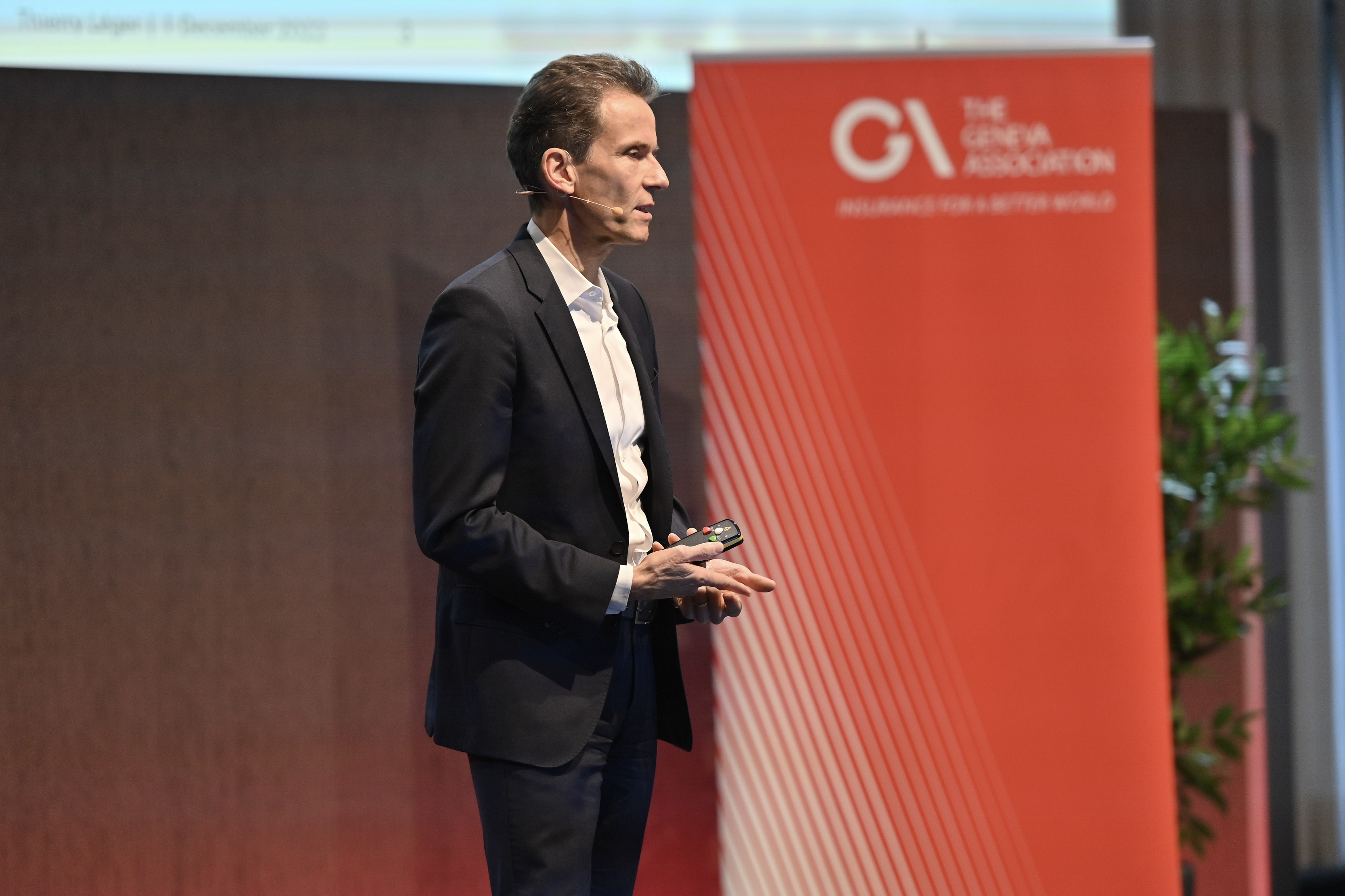
In his opening keynote speech, Thierry Leger, (former) Group Chief Underwriting Officer of Swiss Re, addressed the role of insurance in tackling modern societal issues.
The changing socio-economic landscape presents many challenges and opportunities to the insurance sector, especially in light of climate change, the pandemic and war in Ukraine. The United Nations Sustainable Development Goals (UN-SDG) index has started to stagnate, while protection gaps are widening, especially in developing countries. In this context, stakeholders’ expectations are clear: employees are looking for purpose; NGOs and activists have become more influential; regulators and rating agencies are putting pressure on insurers for more due diligence; and shareholders have also become more sensitive to the social impacts of companies. Insurers are expected to find long-term solutions and develop new tools to protect their customers.
However, the insurance industry cannot tackle this challenge on its own. To close these gaps, the public sector will have to join forces with insurers and incentivise risk cover for underserved communities. It might be necessary to accept higher loss ratios, at least in the short term, to expand the coverage of lower-income populations.
Setting the scene: How Insurance Contributes to Social Sustainability – Key messages of the recent Geneva Association research report
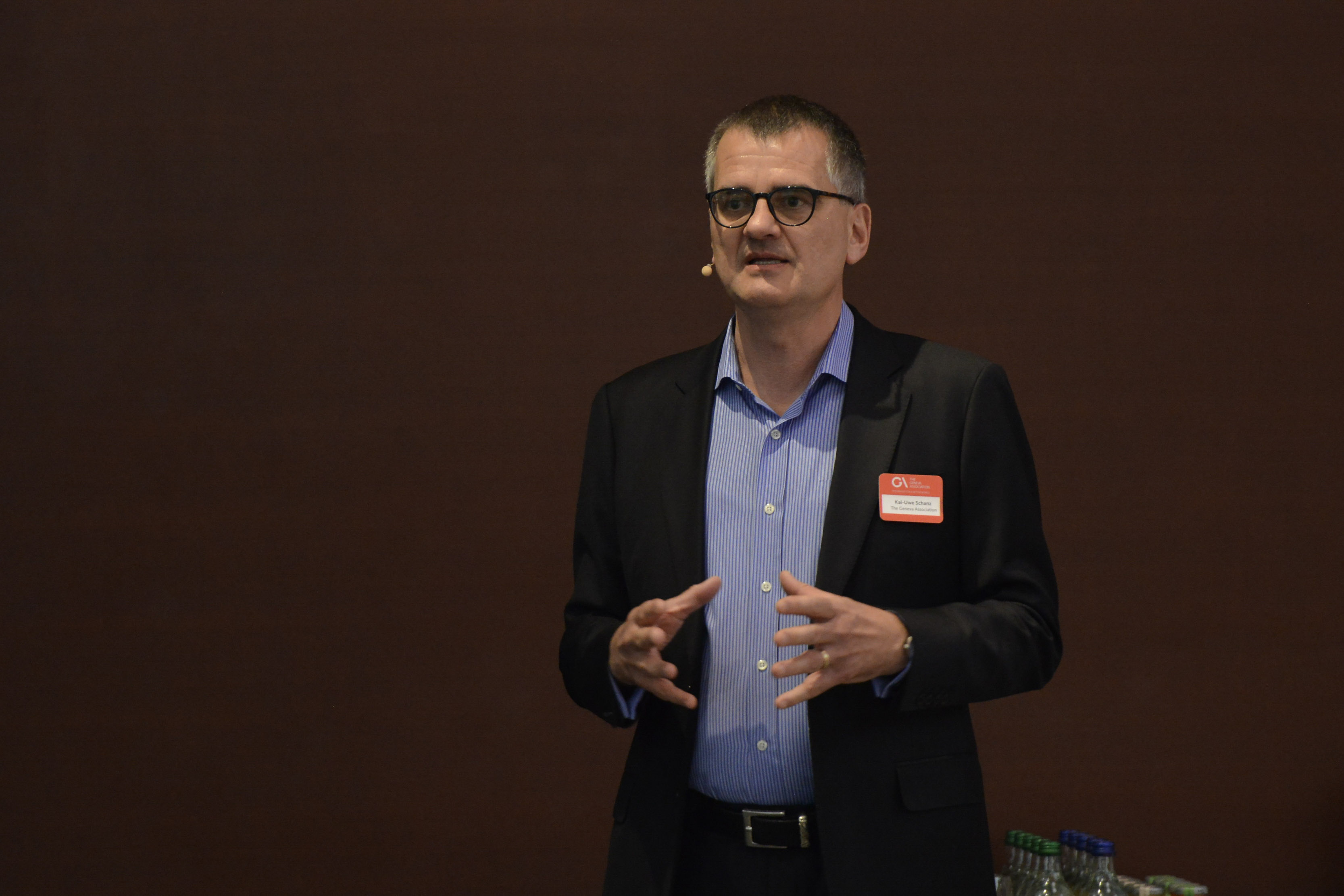
Kai-Uwe Schanz, Deputy Managing Director of The Geneva Association, gave an overview of the current social sustainability landscape and key messages of The Geneva Association’s just-released research report on social sustainability.
The topic of social sustainability has become increasingly relevant. It can be defined from an activity perspective (what should be done) and an outcome perspective (what should be aimed for).
Measuring social sustainability is a key issue, with promising frameworks being developed. Similar to emissions measurement, insurers can classify their social impacts into three main scopes: what they can directly control (e.g. employees), what they directly influence (e.g. local communities) and their value chain activities (e.g. customers, investees).
In this context, insurers have to systematically think about how business-as-usual activities can have a positive social impact, how to develop commercially viable and accessible products for the underserved and then improve risk management to protect the positive impact generated.
Session 1: Building Socio-economic Resilience – A joint public-private responsibility?
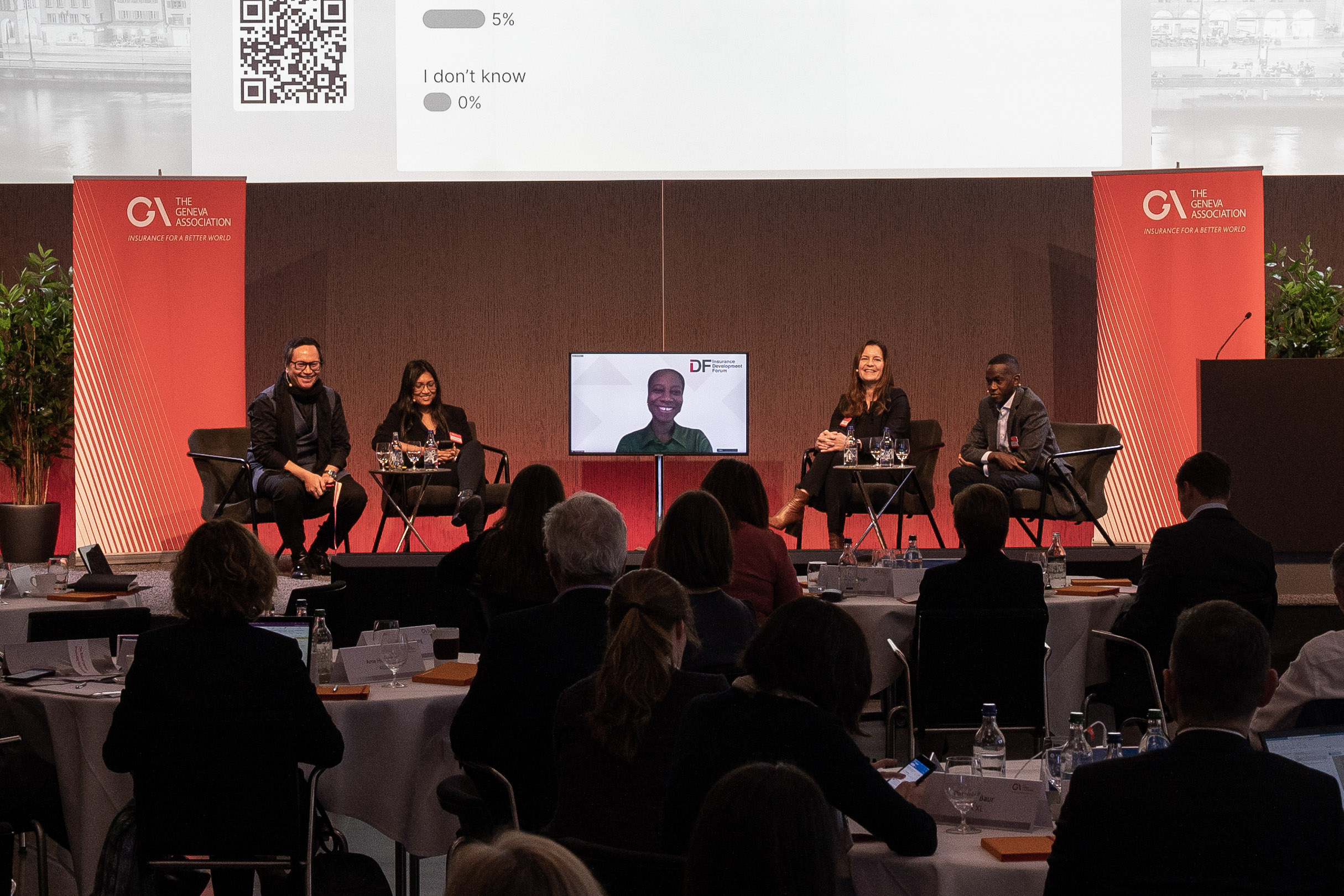
Butch Bacani, Programme Leader, UN Environment Programme's Principles for Sustainable Insurance Initiative; Sara Jane Ahmed, Finance Advisor, Vulnerable Twenty Group of Finance Ministers; Ekhosuehi Iyahen, Secretary General, Insurance Development Forum; Line Hestvik, Chief Sustainability Officer, Allianz; Lesley Ndlovu, CEO, African Risk Capacity
The first panel explored the scope for collaboration between insurers and the public sector to promote socio-economic resilience.
Key messages:
- Particular focus should be given to vulnerable communities and unserved/underserved areas, as these are the most affected by shocks, from natural disasters to pandemics.
- A fund to address residual risk damages is necessary. Initiatives like the Global Shield, a collaboration between governments and other partners that makes risk protection tools available to the private sector, can help structure a response.
- The African Risk Capacity (ARC) is a good example of how public-private partnerships can take a proactive approach to risk and make disaster financing more efficient and effective.
Implications for insurers:
- Insurers should be more transparent about their social and climate impacts.
- Initiatives to raise awareness of the value of insurance need to be expanded, particularly with the public sector.
- New ways to distribute sustainable insurance products and services need to be developed, and insurers should also consider partnerships with sectors other than just governments, e.g. humanitarian organisations.
Session 2: How Insurers Contribute to Resilience, Through Core Business and Beyond
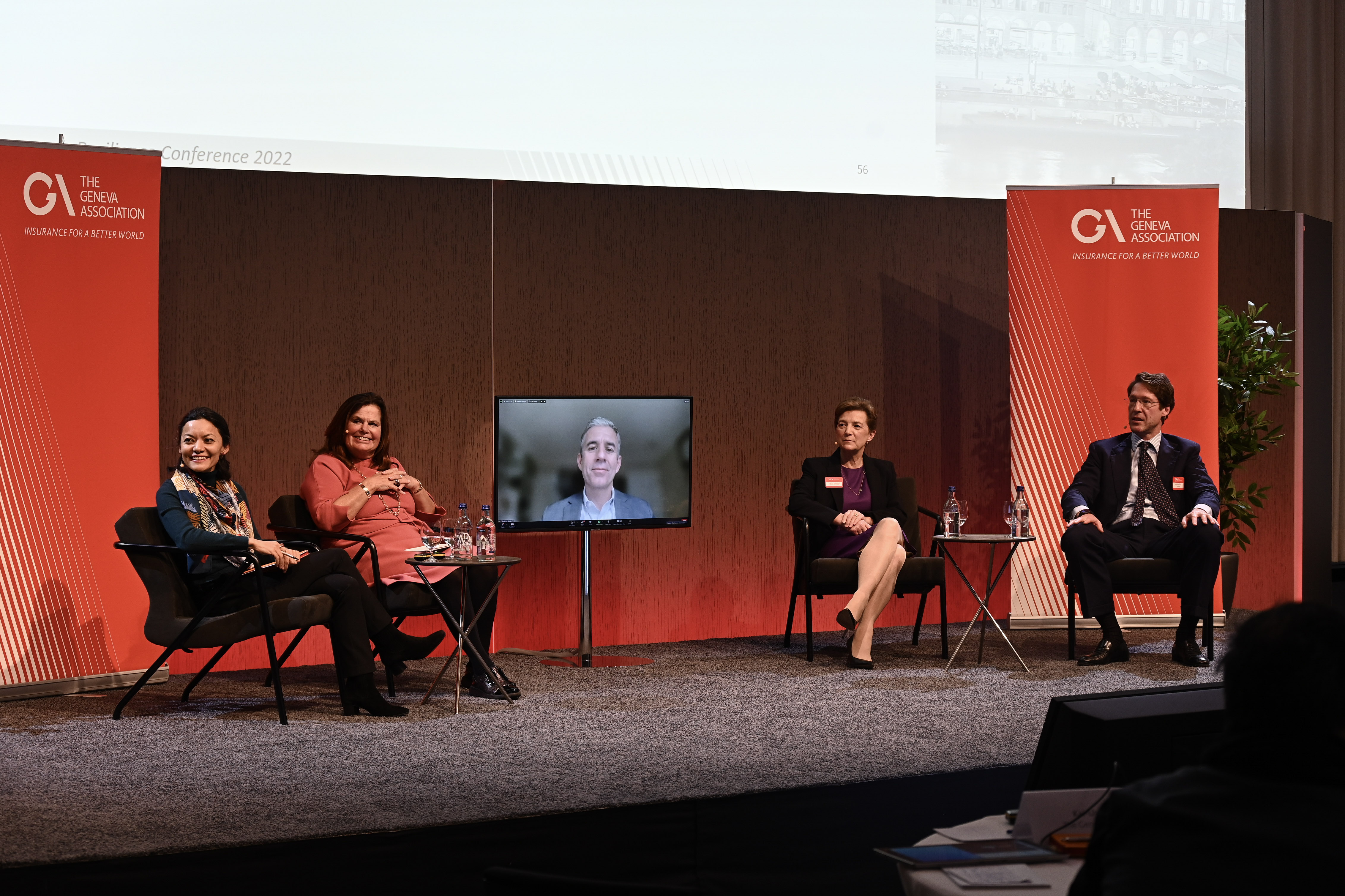
Shailee Pradhan, Senior Sustainability Manager, Swiss Re; Wilma de Bruijn, General Manager, EURAPCO; Federico Spagnoli, Emerging Markets Ecosystems, Product Head & Regional President Latin America, Prudential Financial; Hayley Robinson, Group Chief Underwriting Officer, Zurich Insurance; Bruno Scaroni, Group Chief Transformation Officer, Generali
This panel discussed possible avenues for action by insurers when it comes to increasing social resilience.
Key messages:
- Socio-economic resilience is about absorbing and adapting to shocks, with public and private institutions playing a crucial role in maintaining people's security.
- Insurers must work towards sustainability, both in their own operations and in supporting companies (corporate customers, investees) in their transition towards net zero.
- They should also aim to be lifetime partners for their customers, offering support and services beyond claims and reimbursement.
- Health and well-being are key areas where insurers can contribute – through telemedicine, education and programmes that incentivise healthier lifestyles.
- Insurers should also be aware of the challenges posed by demographic shifts, especially ageing populations, and the need to reach the un/under-served.
- Digitalisation offers opportunities to improve access, reduce costs and build trust through data management and privacy.
Implications for insurers:
- Insurers should be transparent and open about the costs and limitations of building resilience, and work with their customers to find the best solutions.
- Claims management should go beyond reimbursement to include counselling and other support services in the aftermath of tragedies or disasters.
- Insurers should embrace digitalisation, while also addressing the important issues of privacy and digital exclusion.
Session 3: Measuring and Managing Insurance Contributions to Socio-economic Resilience

Mathieu Verillaud, Valuing Impact, AXA Climate; Mónica Zuleta Diaz, Corporate Sustainability Director, MAPFRE; Žiga Žarnić, Head of SDGs & Impact Measurement, OECD; David Schofield, Sustainability Director, Aviva; Barend van Bergen, Sustainability Partner, EY-Parthenon & Global Long Term Value Methodology Leader, EY
The final panel session covered the issue of measuring social impacts and which frameworks could be most effective.
Key messages:
- People’s well-being should be the focus of socio-economic resilience efforts.
- The granularity of data used to measure social impact, as well as when it was collected and how often, must be taken into account and understood to make information comparable.
- Climate change and social resilience are interconnected and insurers must take action to address both together, rather than one or the other.
Implications for insurers:
- A comprehensive approach to measuring social impact is necessary, with special attention to employee, consumer and stakeholder well-being along the entire value chain.
- To be transparent, insurers should publish data manifestos and privacy guidelines on data handling.
- Insurers should tell a better story about the positive impact of social considerations on customer outcomes and growth.
Keynote speech: The Role of Insurance in Facilitating the Green and Just Transition
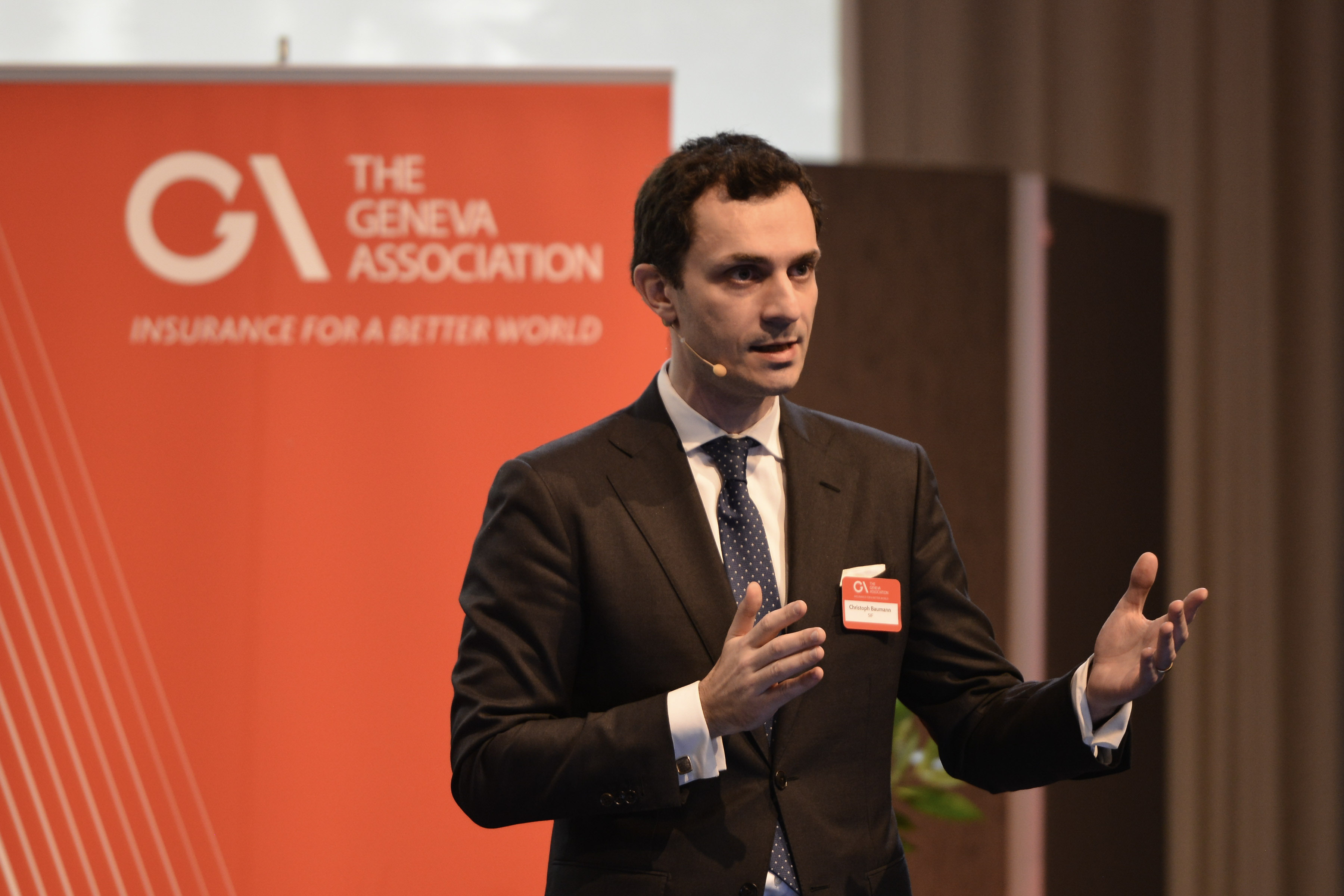
In his closing keynote speech, Christoph Baumann, Envoy of Sustainable Finance at the Swiss State Secretariat for International Finance, discussed the role of insurance in promoting a fair net-zero transition.
Insurance has a crucial role to play in building long-term resilience. Insurers’ underwriting experience makes them well positioned to help firms and individuals tackle transition risks, especially those related to carbon. Furthermore, as asset owners, insurers must ensure financial flows align with climate goals.
Biodiversity loss and climate change are fundamentally linked, with half of the world's GDP potentially at risk. Greater transparency and disclosure will be key, and attention is shifting towards a just and fair transition that accounts for social aspects and inequality. There is a need to translate social issues into quantifiable metrics for institutions and regulators. Focus is currently on the investment side, but there is room for bigger impact on the underwriting side.






